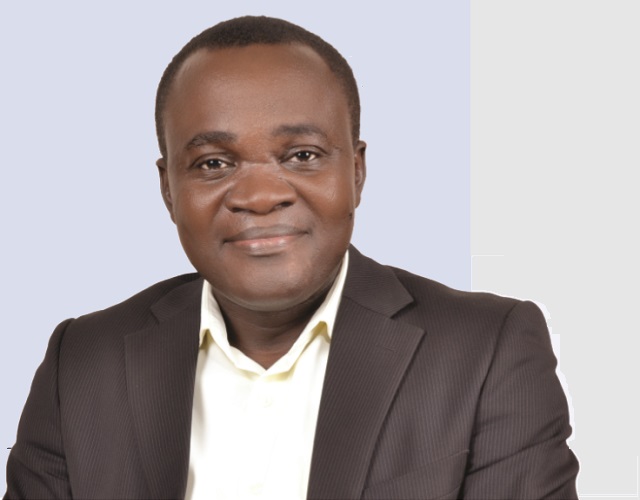
Kampala, Uganda | THE INDEPENDENT | Dr. Deus Kamunyu Muhwezi has officially taken over office for a second term as head of Makerere University Academic Staff Association (MUASA). He was inaugurated alongside his 16 member team at a swearing ceremony presided over by High Court Registrar and Commission of oath, Allan Mpirwe Gakyaro at the Central Teaching Facility II at the College of Business and Management Sciences (CoBAMS) on Friday.
Shortly after taking Oath, Dr. Kamunyu listed ten issues, which he said will be his key areas of focus. Kamunyu, who was overwhelmingly returned after serving six-months suspension from the university says the past two years at the helm of the association have educated him and given him a lot of satisfaction.
“I now know that in a busy and brainy workplace like ours, people put their faith in leaders simply because they think they will work justly towards an enabling environment for all to excel, protect each other and promote peaceful coexistence,” Dr. Kamunyu said. He argues that University staff are often consumed by their work and can easily let their trust go unchecked and risk being misled to believe and act in ignorance.
He has rallied staff to forget the past and pave way for continued working relations with Management and Council on the underlying issues pertaining their welfare.
Achieving the 15 million for a Professor pro rata
On top of Kamunyu’s agenda is achieving the Shillings 15 million pay for a Professor. In the last two years, the staff achieved three salary increments (July 2018, January 2019 and July 2019). Although staff had hoped that by July 2019, the Shillings 15M enhancements for a Professor and pro rata would be achieved, it wasn’t possible as government adjusted the fulfillment of the presidential pledge.
“You are all aware of HE the President of Uganda’s confirmation that the 15M will be delivered in July 2020 and we are glad. We are also counting Council and Management’s support to realize it. This pledge has been a source of unnecessary anxiety among staff of public universities for now close to five years. On my side, I envision peace and productive staff thereafter and in line with the vision of this country,” Kamunyu says.
Staff Medical Insurance
Dr. Kamunyu also expressed deep passion to ensure that they put in place a competitive medical insurance scheme for staff and their dependants. URN understands that the University Council established the Makerere University Staff Medical Insurance Scheme within the capabilities of the budget to benefit university employees.
However, due to calls for the scheme to be expanded to benefit staff dependents, Council bench-marked other schemes in the country. It was established that staff at Kyambogo University for instance contribute 2% of their salary to the health insurance scheme to cater for at least four family members.
Professor Barnabas Nawangwe, the Makerere University Vice Chancellor says negotiations to conclude a new contract for the health insurance scheme have been halted to allow for input of the associations. The three staff associations; MUASA, MASA for administrative staff and NUEI – for support staff are expected to submit resolutions not later than Friday 6th March 2020.
“On our aside a committee of experts is working around the clock to deliver on the draft proposal. It’s my hope that Management and Council will smoothly work with us to arrive at the best deal as soon as possible. On behalf of the executive, I applaud our predecessors, Management and Council for reaching at the concluded contract and I hope for a better contract ahead,” Kamunyu discloses.
Staff Promotions
Dr. Kamunyu says pressure has already begun pilling on the Association Executive to conclude a deal on the resumption of normal staff promotions. In a July 2019, URN reported how the University had suspended all staff promotions and new recruitments as a result of budget shortfalls.
The institution is currently experiencing budget implementation challenges including a wage bill deficit of UGX 14.619 Billion and domestic arrears of UGX 46 Billion including the arrears owed to Makerere University Retirement Benefits Scheme (MURBS).
But Kamunyu argues that “Makerere University Academic staff compete on the global stage and the freezing of promotions for a year is a disincentive to us and demoralization is felt. Every day, I have to answer more than five messages on promotions and something needs to be done urgently.”
Human Resources Manual
According to Dr. Kamunyu, the current Human Resource Manual (2009) has been a subject of debate for now close to four years with staff mainly reflecting on its competitiveness.
He says staff largely view it as a prohibitive guide to academic growth, saying it isn’t properly aligned to other laws. According to MUASA, the manual has also been a subject of manipulation especially by those who wish to gain unfair advantage or lock colleagues out of leadership competitions.
“We wish to work with Management and Council to have a stable but competitive Human Resource Manual that is also sensitive to local working conditions, the dictates of the labour markets, alignment to labour laws and one that is consistent with global academic growth trends. We have been invited to partake in the process of review and we are grateful,” Kamunyu discloses.
Staff Savings
MUASA has over 1200 academic staff, whose numerical strength according to Dr. Kamunyu is undermined by small groupings. He says the staff can gain financial independence, increase their access to cheap credit by saving little together which has been sung for a long time.
“We want to promote the already registered SACCO and negotiate a consolidation/merger of the current established efforts. We want to emphasize good governance through a strong trustee policy and increase trust and confidence among staff to actively save with the SACCOs. We have lessons to learn from MURBS,” Kamunyu.
Bereavement and Emergency Medical Fund
Kamunyu says he wants to introduce and maintain a compassionate initiative to support staff undergoing tragic moments, such as loss of relatives, special emergency health care needs among others.
“All over the world, dynamic working people today secure their lives and give hope to each other through such. We have pretested this already and we know that it can work well under a board of trustees. This idea also complements the efforts of Management and Council and if possible let the work on make good of welfare policy that supports this initiative start,” Kamunyu.
MUASA Secretariat & Home
Kamunyu intends to set up a fully resourced secretariat with a view of increasing access to member services and enhance executive efficiency and we need to act immediately. He argues that the MUASA Executive is made up of full time Academic Staff and yet members expect a lot from them.
The new executive says it intends to employ a full time Administrator and high performance project officers and deploy volunteers/interns to increase access to member services in the next two years. “My desire is to give MUASA a functional physical identity. We hope that Management and Council will support us in realizing a dream home with full board services for even our retired members (e.g. Oxford Union equivalent). MUASA will relocate from staff offices to its functional home at the Senior Staff Club with immediate effect,” Kamunyu discloses.
Research and Publication
Kamunyu says they want do something that keeps all staff together as academics. He believes that promoting research and publication among staff and increasing their presence and relevance to society is primary.
“Our attempts on negotiating a research fund yielded in 2018 and we want to do more as we advocate for a competitive grants management structure. We want to organise debates and public lectures on critical issues that affect our society. We want to organise a multidisciplinary research conference yearly on issues of national significance in conjunction with Mak Publishing House, Kamunyu reveals.
Good governance
Dr. Kamunyu says his executive in the last two years stood for good governance and wants to continue to do so. He argues that Universities that have a weak accountability culture that deviate from their established policy direction and human resource best practices usually risk losing their strategic direction and can be a breeding ground for unending conflicts based on false academic ambitions and distortive individual interests.
He says they won’t cow down in advocating for competence based governance system that has a strong element of consensus building aligned to established laws that govern public universities. “We will continue advocating for progressive and dynamic policies in academic human resource management and stand against manipulation of our established rules. We will promote self-censorship among members especially on issues that undermine our productivity and image,” he says.
Building a warm and principled relationship between MUASA, Management and Council
According to Kamunyu, leadership is a joint venture where stakeholders should fulfill their mandates without undermining each other. He says conflicts emerge when people forget that they play complimentary roles that require mutual respect.
“We want to build trust through effective issue based communication, engagement and dialogue with Management and Council. We desire an increase in team building events where we can share candidly as people who want Makerere University to be the best in every aspect of our service to society,” he discloses.
The Chairperson of the ruling National Resistance Movement (NRM) Workers League, James Tweheyo has warned against management’s continued attempts to undermine staff associations. He says the staff problems and administration are caused by unnecessary fears which must be addressed.
Daniel Fred Kidega, the Vice Chairperson Makerere University Council says he is impressed by the move of MUASA leadership towards cooperation and improving conversations between Management, Council and staff associations.
*****
URN
 The Independent Uganda: You get the Truth we Pay the Price
The Independent Uganda: You get the Truth we Pay the Price



